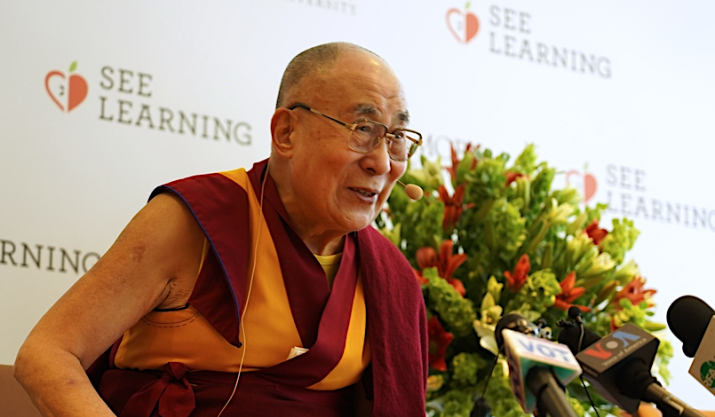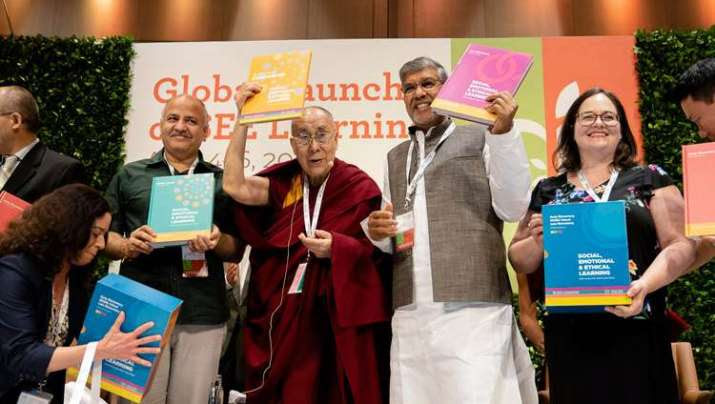By Shyamal Sinha

The global launch of the landmark Social, Emotional and Ethical (SEE) Learning program developed by Emory University in collaboration with the Dalai Lama Trust and the Vana Foundation. The lats week gathering in the Indian capital, featuring a host of educational experts and policy leaders from around the world, stressed the importance of ethics at all levels of education as a foundational element of a route toward creating a more peaceful and compassionate world.
“A happy world cannot exist without human compassion,” His Holiness remarked during the launch event. “Therefore, the education system should include the education of warm-heartedness.”
“Much of the suffering in the world today is of our own creation. Everybody wants to be happy and no one wants to be miserable. Having a few people exercising power and exploiting the majority is a hangover from feudal times, and yet we live in a largely democratic world in which power belongs to the people. In such a world it’s immoral to order others to go and fight. Differences between people need to be solved through dialogue because we live in a global community. We take part in a global economy and we all face the challenge of climate change.
“Discarding weapons, we must adopt a non-violent approach following the Indian traditions of ahimsaand karuna. We need to learn from kindergarten onwards how to tackle destructive emotions and how to combine an understanding of the workings of the mind and emotions with modern education. If this can be achieved in India, others may follow.” (The Office of His Holiness the Dalai Lama)
The SEE Learning program is part of Emory University’s new Center for Contemplative Science and Compassion-Based Ethics, formerly the Emory-Tibet Partnership, a program within the Emory College of Arts and Sciences (ECAS) that was established as a result of a gift of US$11 million from the Colorado-based Yeshe Khorlo Foundation and the Dalai Lama’s Gaden Phodrang Foundation.
“We greatly appreciate the generous gifts that enabled us to develop a compassion-based, ethics curriculum that represents the culmination of more than two decades of academic cross-cultural collaboration between Emory and the Dalai Lama’s institutions,” said ECAS Dean Michael A. Elliott. “The intersection between health and science is very much part of Emory’s mission, and has resulted in contributions to the well-being and quality of life for our local and global communities.”=
SEE Learning developed at Emory provides educators with a holistic framework and resources for incorporating social, emotional, and ethical values in K-12 education programs, as well as for students pursuing higher and professional degrees. According to the program developers:
“SEE Learning builds off of the best practices in social-emotional learning (SEL) programs, but goes beyond them to include new topics such as attention training, the cultivation of compassion for self and others, resiliency skills, systems thinking, and ethical discernment. SEE Learning has been developed with the help of a team of experts in developmental psychology, education, and neuroscience, as well as the vision and support of the Dalai Lama, who has long called for an education of heart and mind and a universal, non-sectarian approach to bringing the ethical development of the whole child into education.” (Emory University)
A high school curriculum has been planned for 2020 and an online platform is being developed for SEE teachers. The curriculum is currently being translated into 14 languages.
The Dalai Lama has maintained ties with Atlanta, Georgia-based Emory University since his first visit in 1987. He received an honorary Doctor of Divinity degree following his 1998 commencement address there, and in 2007 His Holiness was named Presidential Distinguished Professor, the first university appointment that he ever accepted.
“Scientific research has shown that ethical development, alongside social and emotional learning, contribute to a student’s physical, psychological, and social well-being, helping them to succeed not just academically, but in life,” Lobsang Tenzin Negi, executive director of the new center and professor of practice in the Emory Department of Religion was quoted as saying. “There is a growing awareness of the effects of stress on young people and the need to incorporate social, emotional and ethical learning into standard K-12 academic curricula to address the needs of the whole child.” (Emory University)
In addition to His Holiness, the launch event was attended by globally recognized experts in social and emotional learning Dr. Daniele Goleman, an authority on emotional and social intelligence; Fulbright scholar Linda Lantieri, a faculty member at Hunter College in New York; Dr. Kimberly Schonet-Reichl, director of the Human Early Learning Partnership in the School of Population and Public Health at the University of British Columbia; and Brandon Ozawa De Silva, associate director of SEE learning centre at Emory University, along with more than a thousand education and policy leaders from across the world, including Nobel Peace laureate and children’s rights activist Kailash Stayarthi.

“Time is always moving on; nothing can stop it. We can’t change the past, but we can shape the future,” the Dalai Lama observed. “The more compassionate you are, the more you will find inner peace. However, education systems today tend not to adequately enhance basic human nature. Nevertheless, education is a key factor in creating a better future.
“The 20th century, with its killing and violence, has gone, but we can still learn from it. It was a time when people placed too much emphasis on violence and the use of force, squandering time and money on developing weapons. However, violence will never solve problems. While external disarmament is necessary, it’s internal disarmament that is crucial. Anger is of no use; it’s only detrimental. The 21st century can become a more peaceful era if we adopt a realistic approach. But if it is to be achieved, we need to make an effort now.” (The Office of His Holiness the Dalai Lama)
source – Buddhistdoor global











